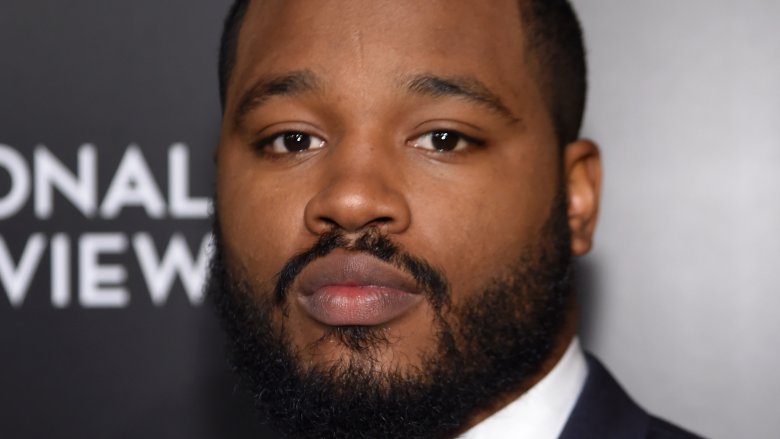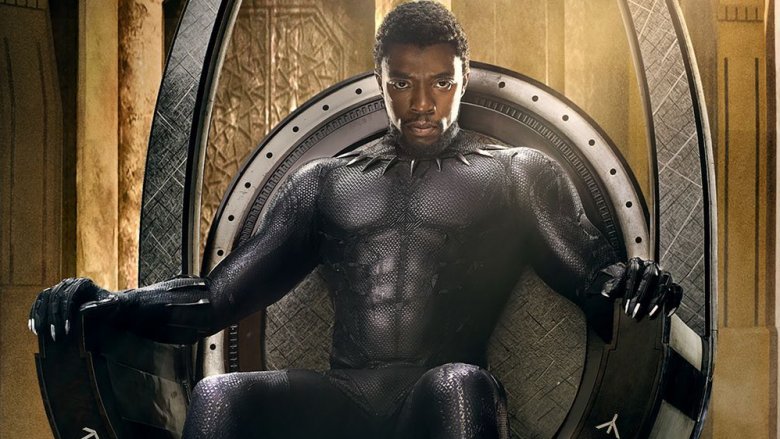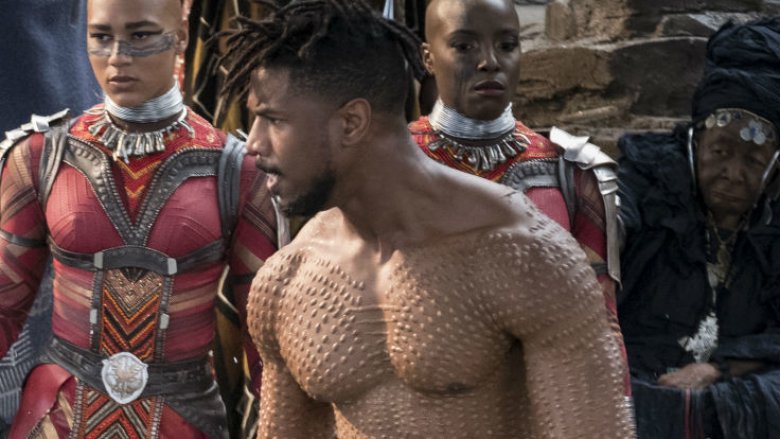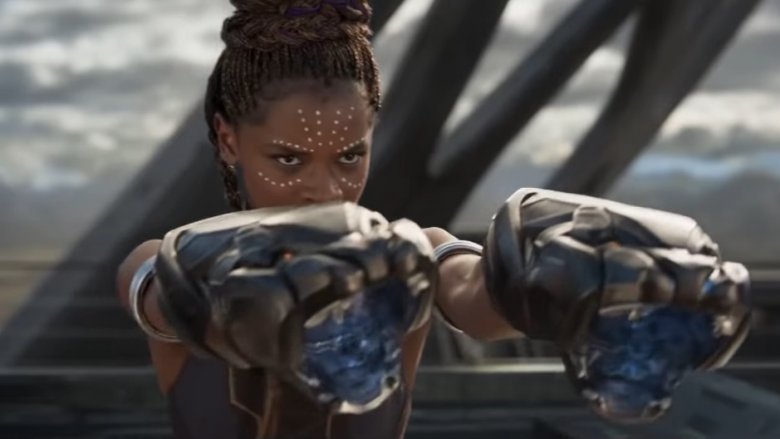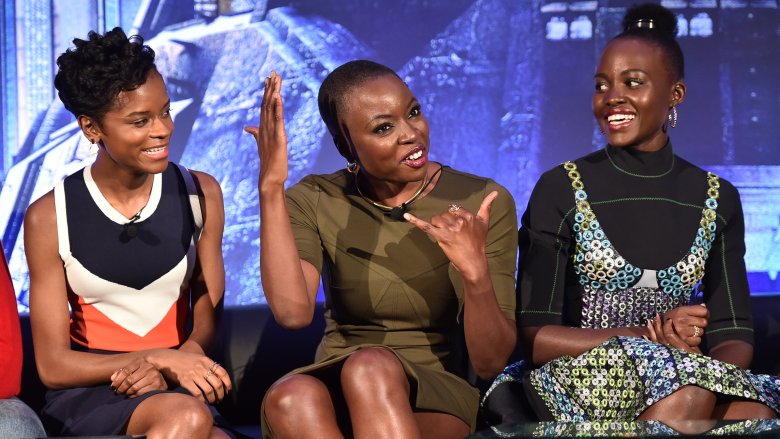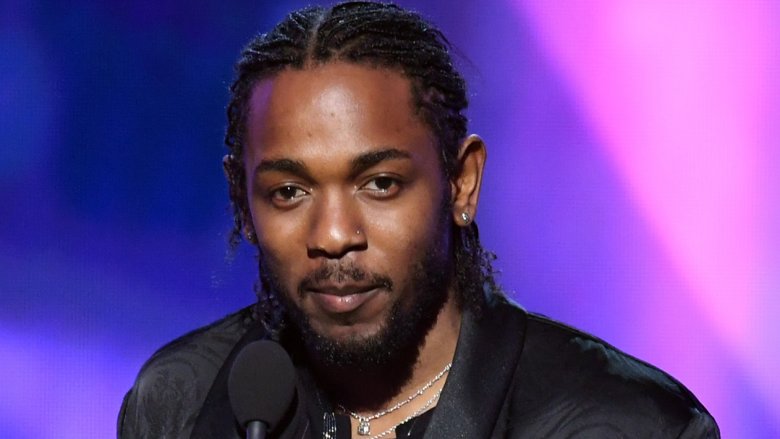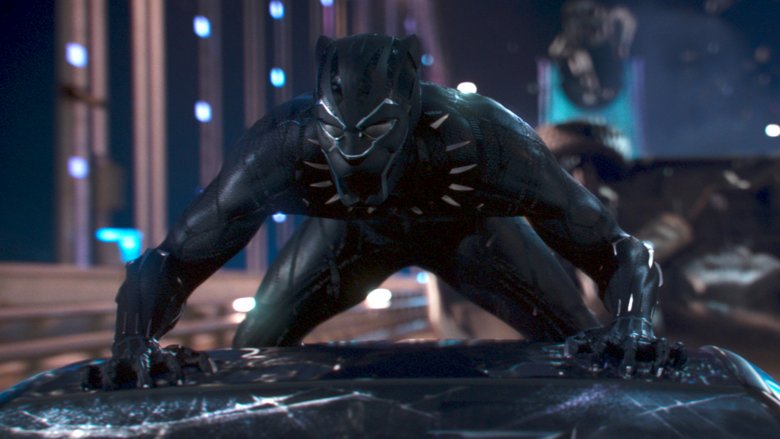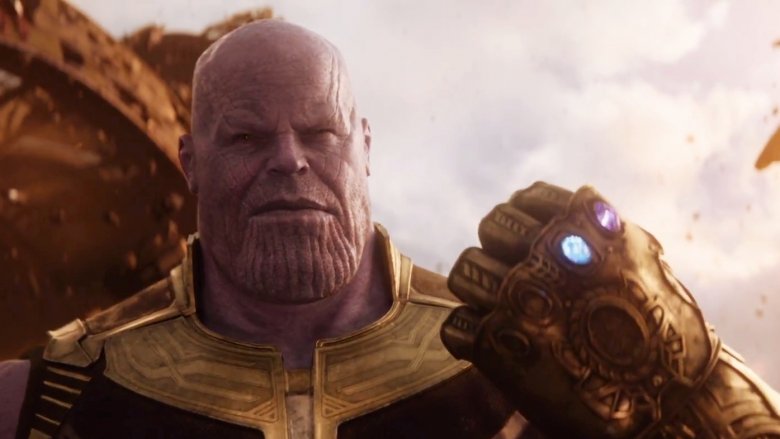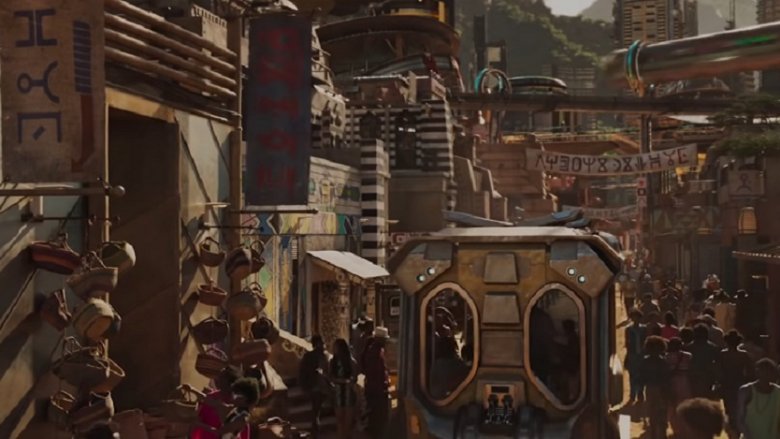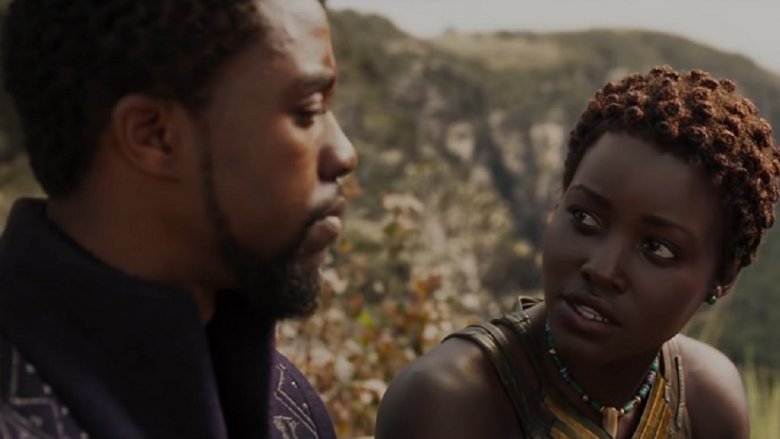Why Black Panther Will Blow You Away
Marvel's Black Panther had its world premiere on January 29, and afterwards, the star-studded audience promptly took to Twitter to lose their freaking minds. The film is being hailed as an astonishing work from third-time feature director Ryan Coogler, featuring top-flight performances from a uniformly awesome cast. Their reactions have Marvel fans champing at the bit to feast their eyes on Black Panther, which posted the highest ticket pre-sales of any superhero movie ever.
While it sometimes seems like Marvel Studios can do nothing but hit home run after home run, there are a number of factors indicating that this one could be truly special. So while we wait for King T'Challa of Wakanda to take center stage, let's take a look at the ridiculous talent involved with Black Panther — and find out why pundits are saying it's easily one of the MCU's best films to date.
Ryan Coogler is insanely talented
Ryan Coogler's first feature, Fruitvale Station, won the Grand Jury Prize at Sundance and garnered near-universal acclaim; his second, Creed, instantly became known as one of the best entries in the Rocky series and cleaned up at the box office while winning a slew of awards. Black Panther is a pretty heavy assignment for his third feature — and he's only 31.
The writer/director has been a fan of the character since childhood, which Marvel Studios head honcho Kevin Feige says was a major factor in his hiring. Speaking with Entertainment Weekly, Feige said Coogler made the film "for his 8-year old self ... most importantly, you do it for other 8-year-olds, to inspire the next generation the way we were inspired. And in this case, when Ryan was growing up, perhaps there weren't that many of these heroes to be inspired by that looked like him."
Chadwick Boseman inhabits his character
T'Challa was introduced to film audiences in 2016's Captain America: Civil War, a movie already stuffed to the brim with heroes and tasked with also introducing Spider-Man to the MCU. Screenwriters Christopher Markus and Stephen McFeely did an admirable job of giving T'Challa a complete arc with a limited amount of screen time, but it was Chadwick Boseman's regal performance that really sold audiences on the Wakandan prince-turned-king-turned-superhero.
Of course, Marvel has a long history of completely nailing the casting of its leads, from Robert Downey Jr. (who at this point is practically indistinguishable from Tony Stark) to Tom Holland (whose pitch-perfect Peter Parker may very well be the face of the franchise in the MCU's next phase). Boseman, who had already proven his formidable acting chops prior to joining the MCU by taking on the roles of baseball great Jackie Robinson and Godfather of Soul James Brown, appears to be yet another casting masterstroke.
Marvel's best villain since Loki?
No Ryan Coogler film would be complete without the director's muse — Michael B. Jordan, a phenomenally talented actor who was Coogler's lead in his previous two films. Jordan's Eric Killmonger is an exiled Wakandan-turned-U.S. Black Ops soldier who returns to challenge T'Challa for the throne, and his "Golden Jaguar" suit — which really kind of looks like a golden version of T'Challa's own suit — had some fans concerned that Marvel was settling for another of the "evil version of the hero"-type villains for which they've taken plenty of criticism in the past. Happily, this appears to not be the case, as the premiere audience was absolutely bonkers over the character.
The Hollywood Reporter tweeted that Killmonger is "a top tier villain for Marvel or otherwise. He owns every scene he's in," while the Los Angeles Times' Jen Yamato said "Michael B. Jordan's Killmonger had me weeping and he's the VILLAIN." Multiple critics used the exact phrase "best villain since Loki," while Film Journal's Rebecca Pahle went even further, calling Killmonger "the MCU's best villain, bar none." Coogler and co-screenwriter Joe Robert Cole appear to have decisively solved the MCU's much-discussed "villain problem," and it certainly doesn't hurt to have cast a red-hot actor who appears to be hitting a career peak.
Scene stealing Shuri
Premiere attendees also had lots to say about Letitia Wright's Shuri, the 16-year old sister of the King. This isn't your typical kid sister role. In the MCU, Wakanda is the most technologically advanced nation on Earth, and Shuri is that nation's biggest brain. Producer Nate Moore told Screen Rant that this means just what you think it does: "They're just 20 or 25 years ahead of us. Having a city built on Vibranium allows them to have all these advances ... and in our incarnation, Shuri is the head of the Wakanda Design Group. She's the smartest person in the world, smarter than Tony Stark but she's a sixteen-year-old girl."
Wright told E! News that the opportunity to possibly inspire young girls to get into science and technology was part of the role's appeal, and if the premiere audience's reactions are any indication, she delivered a standout performance in a film packed with acting talent. Film journalist ReBecca Theodore-Vachon called it "absolutely delightful," pointing out that Shuri is "totally at ease with her brilliance and genius," while New York Magazine editor Kyle Buchanan called Shuri the film's "MVP" before throwing down the gauntlet: "I want a Shuri supercut, I want a Shuri spinoff, I want a capsule collection of Shuri sportswear at Opening Ceremony, and I want these things now!"
Women of power
Shuri is not alone: The premiere audience also saved plenty of raves for the characters of Okoye (Danai Gurira, The Walking Dead) and Nakia (Lupita Nyong'o, 12 Years a Slave), giving credit to Coogler and Cole for creating female characters with their own arcs and motivations apart from the men. Gurira's special forces badass, Nyong'o's master spy, and Wright's brilliant scientist are not only formidable allies for T'Challa, they're the type of well-rounded and capable female characters that are too often absent from Hollywood films in general, to say nothing of superhero blockbusters.
Coogler put his money where his mouth is behind the camera with respect to female representation, saying at a recent press conference that the film "had involvement from brilliant women from all over start to finish," and citing the contributions of cinematographer Rachel Morrison, first assistant director Lisa Satriano and editor Debbie Berman, among others. He went on to point out, "They weren't hired because they were women but because they were the best for the job ... I was incredibly blessed to have these people and their perspectives, and to have their fingerprints all over it."
A killer soundtrack
It was announced in early 2018 that rap luminary Kendrick Lamar would executive produce Black Panther's soundtrack album, and not long thereafter, he made waves by releasing the full track list. It reads like a veritable who's-who of hip-hop, with such big names as Schoolboy Q, Vince Staples, Future, The Weeknd, and Grammy nominee SZA all contributing tracks alongside five new ones from Lamar himself.
It sounds like a winning formula. Marvel has already raised the art of the comic book film soundtrack to new levels by giving the Guardians of the Galaxy films their distinctive classic rock backdrops, and Black Panther looks set to continue that trend while taking a decidedly more hip-hop approach.
It delivers the action-packed goods
With all of the talent on board, it's safe to say we're getting a master class in acting from Black Panther — but it wouldn't be a Marvel movie without plenty of action-packed set pieces, and the premiere audience was overwhelming in its verdict that Black Panther delivers resoundingly. Coogler's tight, riveting fight sequences were a widely praised aspect of Creed, and it appears that he's made a seamless transition from boxing trunks to vibranium suits.
Some of the fight scenes were screened early for the U.S. Congressional Black Caucus, where they quickly drew an intriguing comparison to the over-the-top, kinetic action of the Kingsmen film series mixed with Coogler's knack for gritty realism. The premiere audience agreed: Fandango managing editor Erik Davis likened Black Panther to "the James Bond of the MCU," while USA Today entertainment writer Brian Pruitt praised the film's "crazy innovative action." The film's trailers promise copious amounts of butt-kicking from both the male and female cast, and showcase one sequence — a frantic chase down a busy street involving Andy Serkis' Ulysses Klaue — that looks like it has the potential to be one of the most bonkers chase scenes ever put to film.
Post-credits scenes with an impact
True to Marvel's form, Black Panther features two post-credits scenes, and some members of the premiere audience — while not allowed to say too much — have implied that both of them are among the more significant such scenes of any Marvel movies. Charles Murphy, co-editor in chief of the website MCU Exchange, could hardly contain himself in tweeting, "one is a potential HUGE game changer for beyond Avengers 4 and lines up with one VERY, VERY interesting thing I heard a while back. The other is probably common sense and something you may have guessed at already."
Common sense would dictate that one of these scenes will help set the stage for Avengers: Infinity War, which is the next film on Marvel's slate. But Murphy's allusion to events "beyond Avengers 4" seems to suggest that the other will serve a purpose unlike any post-credits scene to date: offering a glimpse of what we can possibly expect to see in the MCU's Phase 4, after the conclusion of the three-phase mega-arc we've been watching unfold for the last decade.
A truly African Marvel movie
It's fair to say that among Western audiences, Africa suffers from an inaccurate image. White audiences in particular tend to think of African nations as poor and backwards, which is why a mainstream film — a Marvel film —featuring a technologically advanced African superhero feels so revolutionary. Nyong'o (who was raised in Kenya) hit the nail on the head while speaking with Reuters at the premiere, saying, "Something like Marvel has a way of really affecting popular culture, and to have that popular culture informed with things that are of African origin ... is powerful. Hopefully it changes the general idea of what being an African is. Too often times we see Africa as a place that is wanting, and here it's a place that you want to go."
She may be onto something there: more than one observer, including Agents of S.H.I.E.L.D.'s Chloe Bennet, used the words "cultural phenomenon" in describing the film. The more diverse viewpoints are given mainstream voices, the greater diversity of awesome stories there are to be told — which seems to not only be a lesson we can learn from Black Panther's almost certain runaway success, but one of the film's major themes. The Times' Yamato reflected that it's a movie "about why representation & identity matters, and how tragic it is when those things are denied to people."
A film with a message
As a superhero tentpole film with a predominantly black cast, much has predictably been made of Black Panther's importance to black audiences. But if the premiere crowd had a general consensus, it would be that this is not so much a film for black audiences as it is a very black film which demands to be seen by everyone. Uproxx senior entertainment editor Mike Ryan may have summed up this consensus the most succinctly, tweeting, "BLACK PANTHER is not screwing around. By far the most political Marvel chapter, to the point I had to remind myself this is a Marvel movie. BLACK PANTHER is a movie with a lot to say."
By all indications, in Coogler Marvel found a man with a profound understanding of the potential importance of Black Panther to the cultural landscape. African-American contemporaries such as Ava DuVernay (Selma) and Jordan Peele (Get Out) have in recent years proven decisively that stories told from a black cultural viewpoint can not only generate boatloads of cash and give young black moviegoers the kind of representation they've always lacked, but can also resonate with all audiences. Perhaps it'll take a pop culture titan like Marvel to drive this point home once and for all.
